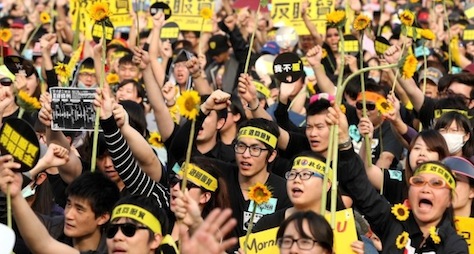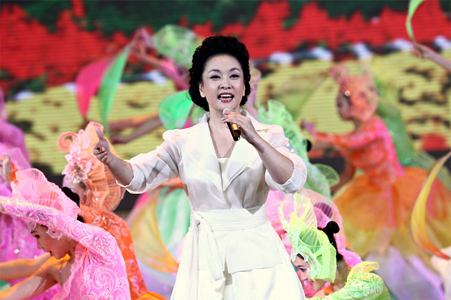 Photo credit to Reuters / Toby Chang.
Photo credit to Reuters / Toby Chang.
In Hong Kong, they may be protesting with umbrellas, but in Taiwan earlier this year, it was sunflowers.![]()
![]()
![]()
As Beijing locks itself into what now seems like a needless showdown with the pro-democracy activists who have formed Hong Kong’s ‘Occupy Central with Peace and Love,’ among the chief incentives for proceeding with caution are mainland China’s relations with the Republic of China (ROC), the island of Taiwan, which split from the People’s Republic of China (PRC) in 1949 in the aftermath of the Chinese civil war and which has maintained its de facto sovereignty ever since, to the annoyance of decades of Chinese leadership.
* * * * *
RELATED: Hong Kong — one country, one-and-a-half systems?
* * * * *
Even as Western commentators trot out tired comparisons to the 1989 Tiananmen Square protests and crackdown (at a time when Hong Kong’s British colonial governors were not prioritizing democratization in any form), the Hong Kong protests have a readier comparison to the ‘Sunflower Student’ movement in Taiwan earlier this spring, when another group of protesters demonstrated against closer ties between Taiwan and the PRC.
In June 2013, Taiwanese president Ma Ying-jeou (馬英九) and the ruling Kuomintang (中國國民黨) signed the Cross-Strait Service Trade Agreement with mainland China, which would liberalize trade in services between Beijing and Taipei, including, most controversially, tourism, finance and communications. When Ma (pictured above) tried to push the CSSTA through the Taiwanese legislature without as much political deliberation as promised, an already skeptical Taiwanese opposition howled, and CSSTA protesters occupied the Legislative Yuan (立法院) to stop Ma’s push to ratify the agreement. Today, Taiwan’s legislature still hasn’t approved the CSSTA.
Moreover, Ma came out in favor of the Hong Kong protests on Monday and reiterated earlier this week his opposition to reunification with mainland China:
“We fully understand and support Hong Kong people in their call for full universal suffrage,” Ma told a gathering of business leaders in Taipei.
“Developments in Hong Kong have drawn the close attention of the world in the past few days. Our government has also been very concerned,” he added. “We urge the mainland authorities to listen to the voice of Hong Kong people and use peaceful and cautious measures to handle these issues.”
Cross-Straits relations have crested and ebbed over the last 65 years, but today it’s indisputable that Taiwan and mainland China have more ties than ever. Since 2008, direct flights between Taiwan and China have greatly intertwined the two economies, and a deluge of Chinese investment has taken root in Taiwan.
While Hong Kong and Taiwan have very different histories and relationships with the PRC, they share many similarities, so it’s not surprising to see so many similarities between the two popular anti-Beijing movements that swept across both jurisdictions in 2014.
In the second half of the 20th century, Taiwan and Hong Kong both became magnets for defectors from the Chinese Communist Party (中国共产党), and both Taiwan and Hong Kong became pockets of economic prosperity while mainland China languished under Mao Zedong (毛泽东) and his fearsome reign of socialism, rural famine and political terror. Throughout, both Hong Kong and Taiwan developed particular cultural identities, such that majorities in both places see themselves today as Hong Kongers and Taiwanese rather than Chinese.
Both Hong Kongers and Taiwanese also worry that Beijing is plotting to bring Hong Kong and Taiwan more firmly within its grasp. If it’s outlandish to think that Beijing can accomplish that goal with military might, it’s not difficult to believe it can do so through economic and political coercion. That’s exactly the kind of insidious influence that motivates both the Occupy Central’s fight for Hong Kong’s democratic sovereignty and the Sunflower Student movement’s fight for Taiwan’s economic sovereignty. Continue reading Taiwan warily eyes battle of wills between Beijing and Hong Kong

